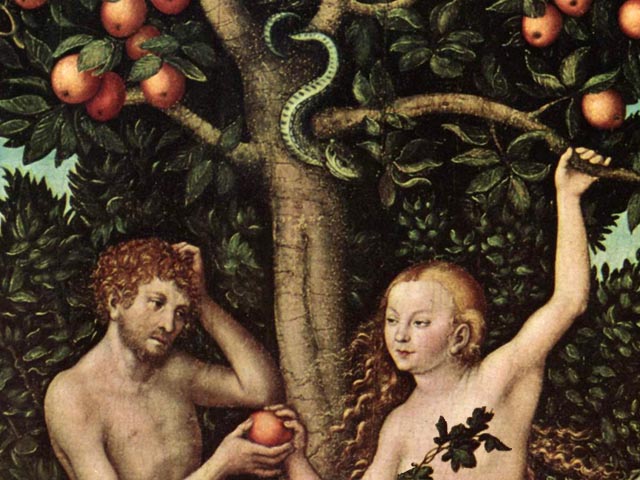
The Bible records that God necessarily created the first man and woman sinless. They chose not to stay that way: does this mean they defeated God’s original purposes?
I. God: The Source of All Life
As we’ve described, the first Chapter of the Book of Genesis describes how God created the entire universe in six days. He first created life – in the form of plants – on the third day, sea creatures and birds on the fifth day, and land creatures – including man – on the sixth day. (If you have a Bible, take a look for yourself, or simply read it here.) Nowhere in the Bible do we ever read that life spontaneously generated itself from the inanimate parts of God’s creation (called, “abiogenesis” by some): we simply read that God created all living things directly. If you take any time to explore the Wiki link on abiogenesis above, you will quickly learn that “life from lifelessness” has never actually been observed: it is merely a hypothesis – a guess. To date, there is not s shred of scientific evidence to support that life has ever created itself.
II. The Life of Man, in Two Parts
In the second chapter of Genesis, we see God being uniquely specific on how He created man, and how He gave him life:
“And the LORD God formed man of the dust of the ground, and breathed into his nostrils the breath of life; and man became a living soul.” (Ge 2:7)
This “quickening” is personal and intimate – resulting in the first man becoming a “living soul.” This is important to remember, because no other living thing is described as possessing a soul in God’s Word. In that the animals are also created by God – while apparently possessing no soul – we see that there are essentially two parts to a human life: 1) Life of the body (as the animals have), and, 2) life of the “soul,” or “spirit.” ( setting man apart from the rest of God’s creation)
If God’s Word is perfect truth – as Christ repeatedly affirmed – then you are more than a body . . . more than mere flesh and blood. God is very careful to make a clear distinction between these separate parts of your life in His Word:
“That which is born of the flesh is flesh; and that which is born of the Spirit is spirit.” (Joh 3:6)
“. . . and I pray God your whole spirit and soul and body be preserved blameless unto the coming of our Lord Jesus Christ.” (1Th 5:23)
“. . . but though our outward man perish, yet the inward man is renewed day by day.” (2Co 4:16)
As the verse immediately above indicates, all of us are going to experience physical death some day. Yet throughout God’s Word, we do not see Him placing much emphasis on the life of the body:
“Whereas ye know not what shall be on the morrow. For what is your life? It is even a vapour, that appeareth for a little time, and then vanisheth away.” (Jas 4:14)
Rather, God seems to focus on the eternal life that we might have in Him:
“And this is the record, that God hath given to us eternal life, and this life is in his Son. He that hath the Son hath life; and he that hath not the Son of God hath not life.” (1Jo 5:11-12, emphasis added)
In the passage above, God the Son tells us that if we do not have Him, we “hath not life.” Since we all must die physically, this can only refer to the death of our spirit . . . the death of our souls. Without Him, we are spiritually dead.
III. The Spiritual Death of Man
Recall that transgressing God’s command constitutes sin, and that God’s attributes of holiness and omnipotence do not allow Him to become an accomplice to it – by doing nothing if sin occurs. Getting back to the first man, God specifically warned him of the certainty of spiritual death if he sinned against Him:
“And the LORD God planted a garden eastward in Eden; and there he put the man whom he had formed. And out of the ground made the LORD God to grow every tree that is pleasant to the sight, and good for food; the tree of life also in the midst of the garden, and the tree of knowledge of good and evil . . . And the LORD God took the man, and put him into the garden of Eden to dress it and to keep it. And the LORD God commanded the man, saying, Of every tree of the garden thou mayest freely eat: But of the tree of the knowledge of good and evil, thou shalt not eat of it: for in the day that thou eatest thereof thou shalt surely die.” (Ge 2:8-9, 15-17)
God prohibits the first man from eating of the “tree of knowledge of good and evil” because doing so would open his eyes to both good and evil – and thereby equip him to decide what is “good” and “evil” for himself. The deadly problem there is obvious, as we have already established that the omnipotent God of the Bible is the source of all truth . . . i.e. the sole establisher of all that is “good” and “evil.” Since God’s holiness does not permit His contact with sin or a sinful man, He must withdraw from man if sin occurs. And this is why he warns Adam not to disobey Him: “. . . for in the day that thou eatest thereof thou shalt surely die.” God the Son will withdraw, where “. . . he that hath not the Son of God hath not life.”
Simply stated, the Bible teaches us that the absence of God is synonymous with spiritual death. Moreover, since God is perfectly just, this death constitutes the legitimate judgment for sin. Time and again throughout scripture, we see God warn us that the only just and acceptable payment for sin is death:
“For the wages of sin is death . . .” (Ro 6:23)
“Behold, all souls are mine; as the soul of the father, so also the soul of the son is mine: the soul that sinneth, it shall die.” (Eze 18:4)
Well . . . you may know the rest of the story, as told in Chapters 2 & 3 of Genesis: 1) God creates a helper for Adam – the first woman, Eve. 2) Satan – in the form of a serpent – deceives Eve into eating of the forbidden fruit, 3) Eve gives this fruit to Adam, and he eats of it as well, 4) Adam and Eve are driven from God’s presence – and suffer immediate spiritual death. Have a look at Chapter 3 of Genesis for yourself. Note that Adam and Eve did not physically die in the same day they sinned against God – Genesis records that Adam lived more than 900 years.
The painting at the top of the page barely begins to capture the anguish of this separation from God – and the bitter curse of death entering a previously perfect world.
As things then stood, the demands of God’s holiness had been satisfied: He had separated Himself from and properly judged sin. The appointed payment for the sinners was both a physical and spiritual death. Outwardly, if we look around the world today, we might be tempted to say that nothing has changed since that fateful day: we see transgressions of Gods commands – theft, murder, hatred – on every side. We also see death everywhere – and we all have a date with a gravesite:
“And as it is appointed unto men once to die, but after this the judgment . . .” (He 9:27)
If the story ended there, there would be no hope for anyone – ever. This website – aimed at pointing the way to hope – would be a spectacular waste of time.
But remember God’s original purpose in creating Man: He made him in His “image,” or “resemblance,” a sinless being. This sinless being was originally purposed to have close contact with Him, and to have dominion over the earth – where God’s omnipotence never allows His purposes to fail.
So what now?!
The key points to understand from this page: separation from God is synonymous with spiritual death. As the source of all life, God’s holiness and justice require a death penalty wherever sin occurs. While Adam and Eve fell into sin and death, we know that this cannot be the end of the story, because God’s original creative purposes must ultimately be fulfilled.

